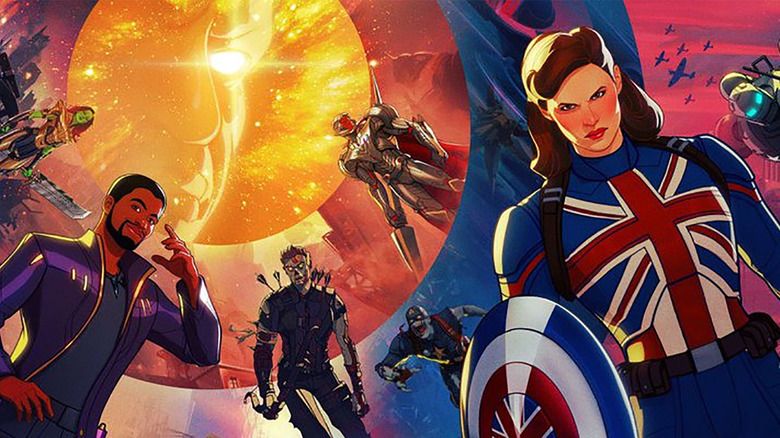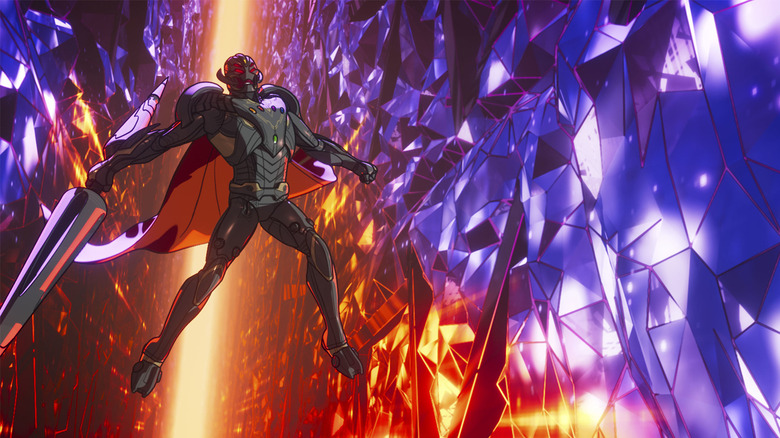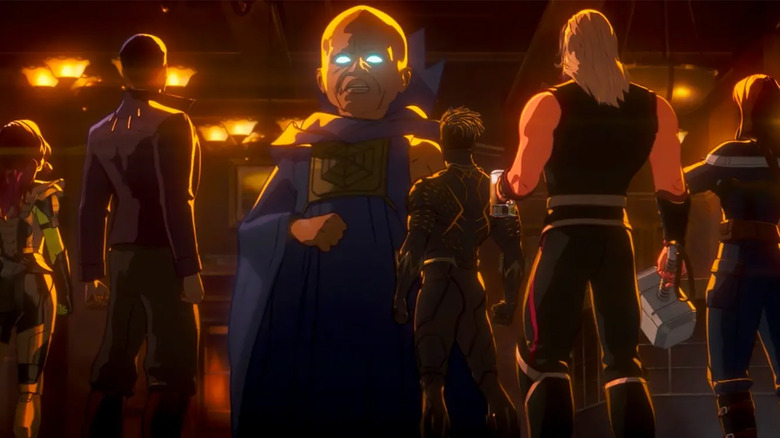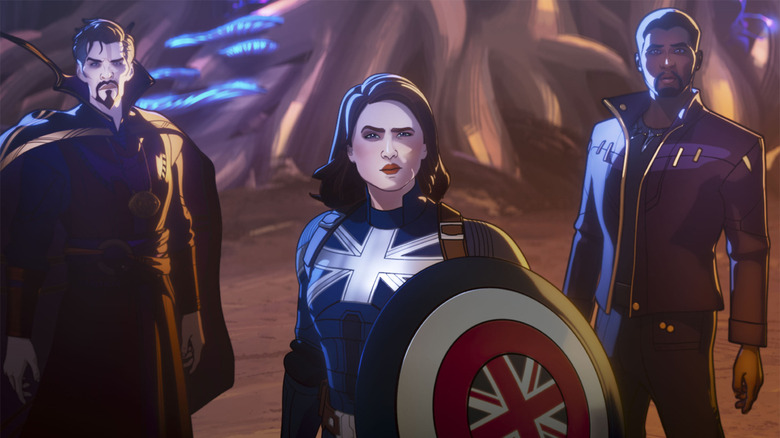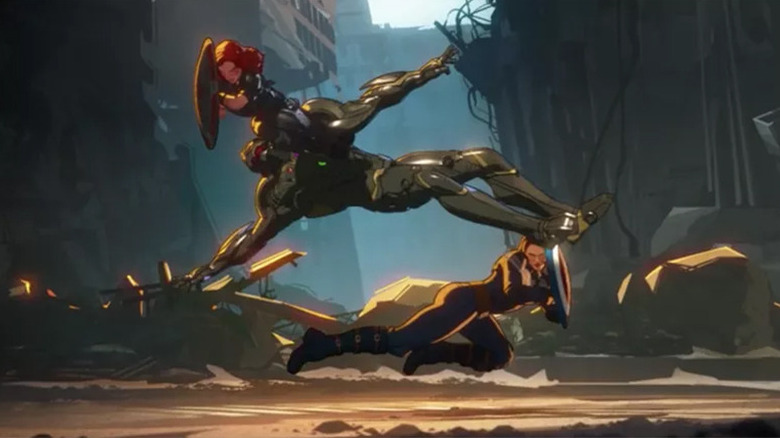Marvel's What If...? Head Writer And Director Tease Season 2 Plans And Talk Infinity Stones Rules [Interview]
The first season finale of Marvel's "What If...?" animated series debuted earlier this week, finally bringing together the superhero team known as the Guardians of the Multiverse. After the episode premiered on Disney+, we spoke with director Bryan Andrews and head writer A.C. Bradley about the season finale and what it could mean for the future of "What If...?" in the second season of the series. Plus, we talk about the rules of the Infinity Stones, crafting the slick action sequences, and more.
"There's a small corner of the multiverse that's just like dead and ravaged."
This interview has been edited for clarity.
So you guys obviously blew the multiverse open in a whole new way, literally and figuratively. But now I'm wondering, after Ultron has been defeated, are these alternate universes still connected, or has that been fixed by the end of this finale and we just don't see it happening?
A.C. Bradley: The way I view it is that Ultron, he bashes away through a couple of universes and pretty much destroy them, which is why The Watcher had her intervened to protect the rest of the multiverse. So in my mind, there's a small corner of the multiverse that's just like dead and ravaged, and now is its own little hellhole.
Bryan Andrews: Yeah, I imagine The Watcher, probably once the villain is defeated, must do something to help but not fix destroyed universes. But at least if there's any seams open, maybe he [fixes the barriers.] Whatever Ultron is able to destroy while he was going across the universes, those are probably some pretty messed up universes.
Right, because I know you guys had to explain to all the fans worried about plot holes online how Ultron was able to use the Infinity Stones in the other universes. And part of that included smashing into other universes and kind of making them one universe.
Andrews: I think also the comics, people keep thinking that the comics are all of it, but the MCU has their own rules. They deviate from the comics many times. What I was told from higher ups was, in the MCU, they don't follow the comic rule, where each stone works only in that universe. They're like, "No, that's not true in the MCU." So stones can work in other universes. It's just that, apparently, they just don't work in the TVA, because that's a very unique place.
Oh, interesting.
Andrews: That was designed specifically where that s**t's inert when it goes in there. But otherwise Doctor Strange couldn't go to the Dark Dimension and use his Time Stone. That's another dimension, but it works there. So yeah, I think people were just thinking, "Well, it's the comics," but the movies never said any of that.
Fair enough.
"I want to go play with Shang-Chi."
So I wanted to ask, was this always the end game, or did it go through a variety of iterations in the writers room?
Bradley: The creation of the Guardians of the Multiverse?
Yeah, the Guardians of the Multiverse coming to together and how that all culminated.
Bradley: The idea of doing a team up was in my original pitch to get the job. There's going to be a team up of some version. In the "What If...?" comics, The Watcher's notorious for being the guy [who's like,] "I can never intervene. I can never do this." And then he intervenes. That's what he is.
Andrews: All the time. It's crazy.
Bradley: He lied to himself. So I definitely wanted to play with that. I wanted The Watcher to be — I mean, he's the audience, he's us. And the more he watches the stories, the more he grows to love these characters, to connect with them, to want to see their stories continue. The idea that the multiverse would be destroyed would leave him without his heroes. So of course he's going to interfere. And of course, he's going to have a plan. He's going to know how it's all going to work out, and he's going to pluck heroes from across the multiverse.
So for me, the fun was, "Okay, who, as we're creating these stories, who do we want to revisit?" And we knew we always wanted to revisit Captain Carter. And Star-Lord T'Challa is also so much fun. Then the challenge and the joy was "Okay, how would Killmonger fit into The Watcher's plan? How would Doctor Strange fit in? How do we use these different storylines, these different characters? And how do we bring them together in a way that feels organic and satisfying?"
Also, it let me off the hook, with at times having darker endings, because I know we're going to see them again. We're going to see Party Thor again, we're going to see Killmonger again. So you get a bit more resolution to their stories in the finale.
In the end, all the heroes have to go back to their own universe. So I assume that means future seasons will continue to follow those heroes and then continue remixing the MCU storylines that we've seen before and follow that trajectory forward.
Bradley: I mean the beauty of the Marvel universe is that it keeps expanding. So I'm looking more forward to in season two. I don't know about you, Bryan, but I want to go play with Shang-Chi. I want to kind of hang out with some of those Black Widow characters. We're going to follow new characters, new stories. That said, that post credit scene is a little bit of a promise or a hope that we get to see Captain Carter again.
"The Watcher throws a Sunday brunch party?"
Yeah, you guys have talked about Captain Carter being the crux of this first season and also a character that you knew you would want to revisit in future seasons. I was actually thinking that credit scene, although it seems hopeful, I couldn't help but notice that scene plays with the beginning of "Captain America: The Winter Soldier." So now I'm wondering if that reunion with Steve Rogers might make him her Winter Soldier instead of the Steve Rogers that she fell in love with.
Bradley: I think you'll have to see.
Andrews: You have to wait and see, good sir.
Bradley: Does that make Natasha Peggy's Bucky Barnes, her BFF?
I guess so!
Bradley: I'm down with that.
You've also previously addressed that here were supposed to be 10 episodes this season, but you ended up cutting the one that was meant to introduce Gamora before she became part of the Guardians of the multiverse. Right?
Andrews: Yep. I mean, "cuts" is a harsh word. It was kind of moved, because it was fully intended to be part of season one. But because of COVID and [all that nonsense], a particular vendor wasn't able to finish [the animation]. They got hit to a certain degree, and that kind of messed up our ability to get it out the door in time. So yeah. But it is being worked on still. And it will be in the second season. So you kind of get to see eventually how it all came to be for them.
Did you have to change anything because we don't get to see this unfold before this finale in order to make it fit into the next round of episodes?
Bradley: No
Andrews: No, not really.
Bradley: We feel like Gamora in episode nine kind of serves as almost a teaser for what's going to happen, that we're going to see her story. We'll see how she becomes friends with Tony Stark. Tony and Gamora never interacted in the MCU, if I remember correctly. It was an episode that was actually slated to air earlier in season one, and it was a funner, lighter, less Tony-murder episode. And I think fans will enjoy it in season two.
Andrews: I think so. Yeah. I think they'll enjoy it.
Right on. So it seems like now we've established the Guardians of the Multiverse, that this is the first Avengers-lever event of the "What If...?" series Does that mean future seasons will bring about another major reason for them to reunite, where The Watcher will have to assemble some of these Guardians and then some new ones as well?
Bradley: The Watcher throws a Sunday brunch party? I'm down for that. We'll see. Season two, I think, is going to surprise some people with the directions that we go in and the stories we choose to tell. The training wheels came off, as far as me and Bryan are concerned, and we just had some fun. Again, there were new toys to play with, because we were crafting these stories in late 2018, early 2019, before even "Endgame" came out. So there's now been a whole slate of movies that we can pull from.
On top of that, now we have the Marvel Studios shows on Disney Plus. Are those also fair play when it comes to mixing those up for "What If...?" episodes?
Andrews: I imagine at some point. The thing is we were doing even our season two stuff while they were still making those. So they were kind of off market for us at the time. But knock on wood, if we get to do more, who knows? But I think anything that's going on in the MCU and that includes those shows, at some point, could be fertile, valid ground for us to go play on. You know what I mean? So we'll see. Who knows? Time will tell. But I think as long as it's in the cinematic universe, there's a chance.
"Some of that stuff was supposed to be in The Avengers."
I wanted to commend the action in this episode. There were a lot of extremely clever ways with which you utilized all these superheroes using their powers together. What's the planning process for that? Do you guys actually work with some of the people who do the choreography and fight coordination for the live action movies to figure that out?
Bradley: Well, Bryan, you guys have the live-action movies storyboarded, [you've worked on] a lot of those action scenes.
Andrews: They're storyboarded first, yeah.
Bradley: Yeah. So people like Bryan are actually figuring them out. So we kind of just sit around and play. What would be cool moments, what would make sense? And then Bryan and the storyboard team goes and pushes the limits, and we play with the visuals. The beauty of storyboarding is that you get to play with visuals and action elements. It's a lot easier, Bryan, correct me if I'm wrong, to draw them than to try and figure this out on a set.
Andrews: Right. The one thing is, if you get some stunt guys doing fight [pre-visualization], that's way faster than drawing it. That stuff can be quite exciting and quite fun. Having said that, when it gets to the big, crazy sequence where they've got to rig up wire [or something like that], we can be like, "Yeah, we're going to do this and do this." We can draw it relatively quick.
In the movies, if you're drawing big effects sequences, those tend to be boards to move on through the process, because it's mainly a visual effect. But often, if you're doing fight stuff, if the stunt guys like a move, they might keep it. If not, they just ditch it. Sometimes they just make up their own stuff. It could be cool, but I've had a lot of stuff over the decade, fall onto the wayside for whatever reason. I was able to grab some of that stuff. It's like, "This is actually good stuff. I don't know why you guys aren't using it." So I'm going to sit on it. And I actually brought some of it to "What If...?" There's a lot of stuff actually in the Captain Carter episode, some of that stuff was supposed to be in "The Avengers."
Oh, cool.
Andrews: Yeah, we just go nuts. We apply the same thing that I apply to the movies, and I've got a talented team I work with, and they'll bring me ideas. Then I'll go in and adjust, do notes as needed. But we've got some talented people, bringing us some good stuff. I just do my best to police it as much as I can and keep it up to the standard of the stuff that we've been doing since the beginning, across all the movies.
The entire first season of "What If...?" is available to stream on Disney+ right now.
